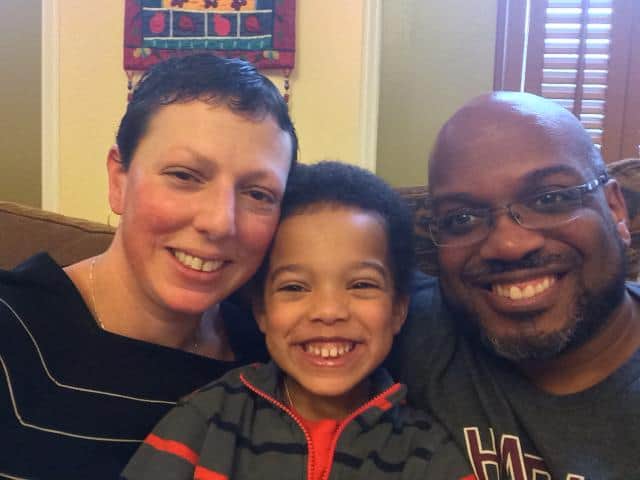By David A. Love
Justice, justice shall you pursue, that you may live, and inherit the land which Adonai your God gives you. (Deuteronomy 16:20).
When I reflect on Dr. Martin Luther King and what his legacy meant to me, I recall a recent Hanukkah protest I attended with my wife Sarah at 30th Street Station in Philadelphia. The purpose of the event—which was held by the local progressive Jewish community and Jews of color–was to show solidarity with the #BlackLivesMatter movement and mourn the deaths of black people killed by police.
As an African-American raising a Jewish child of color, I think about justice a great deal and how to teach my son about the civil and human rights struggles of the past and present. Although we did not bring our son Micah to that protest, we’ve taken him to other such events, such as a #HandsUpDontShoot protest at Temple Law School, where Sarah is a professor. It is hard for 5-year-old to comprehend the complexities of civil rights, racial violence and the movement for social justice. I fear for the safety of my son, who is growing up in a society where black men and black boys are not safe. So we explain the killing of Michael Brown and Eric Garner to him in a manner he can understand. And we tell him that Dr. King turned bad laws into good laws, and that we have to do the same thing.
“Injustice anywhere is a threat to justice everywhere,” Dr. King said. “We are caught in an inescapable network of mutuality, tied in a single garment of destiny. Whatever affects one directly, affects all indirectly.” King lived his life with a commitment to public service. Fighting for justice for everyone was not merely a day-long activity of service to others, but rather a way of life.
I admire King for of his bold stances and his quest for equality for all of us. He spoke out against the segregation and brutality of the day, and condemned America’s evil triplets of racism, poverty and war. In Letter From Birmingham Jail, King elaborated on the “legal and moral responsibility duty to disobey unjust laws.” Further, he criticized the white religious leaders in the South who were silent in the midst of oppression against black people, and called his protest actions untimely.
Martin Luther King’s notion of justice resonated with the Jewish community. Broad Jewish participation in the civil rights movement made sense—given not only the history of oppression and discrimination suffered by the Jewish diaspora, and the shared Exodus narrative of liberation from slavery—but also tzedakah, the pursuit of justice, and tikkun olam, repairing the world, which are two important concepts in Judaism. Jews are taught to actively pursue justice, rather than to wait for injustice and confront it only after it appears. And humanity has a shared responsibility to heal and transform the world.
An important partner of Dr. King in the pursuit of justice and healing was Rabbi Abraham Joshua Heschel. Rabbi Heschel had much to say about racism, segregation, and indifference to the “monstrosity of inequality” as he called it. For example, a century after the Emancipation Proclamation, Heschel said “It is time for the white man to strive for self-emancipation, to set himself free of bigotry.” In a telegram to President Kennedy, he offered that “We forfeit the right to worship God as long as we continue to humiliate negroes. …The hour calls for moral grandeur and spiritual audacity.” And he understood that “In a free society, some are guilty. But all are responsible.”
As we commemorate the fiftieth anniversary of King’s march from Selma to Montgomery, Alabama to secure voting rights for African Americans, it is worth remembering that Rabbi Heschel was there. “For many of us the march from Selma to Montgomery was both protest and prayer,” he noted. “Legs are not lips, and walking is not kneeling. And yet our legs uttered songs. Even without words, our march was worship. I felt my legs were praying.”
In a few profound sentences, Rabbi Heschel was able to capture the powerful spiritual component of the civil rights struggles embodied in the movement led by Dr. King, and the lifelong dedication to tzedakah, and tikkun olam. As we protest today and face the civil rights challenges of the twenty-first century, I want Micah to know that we are in this for the long haul.
David A. Love is a a writer and human rights advocate based in Philadelphia. He is a contributor to theGrio, The Guardian and the Progressive Media Project, and is the Executive Editor of BlackCommentator.com. Love is also the former Executive Director of Witness to Innocence, a national death penalty abolition organization. He is a graduate of Harvard College and the University of Pennsylvania Law School, with a certificate in International Human Rights Law from the University of Oxford.




